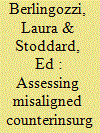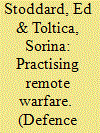| Srl | Item |
| 1 |
ID:
178523


|
|
|
|
|
| Summary/Abstract |
While representing a major military threat in Niger and Nigeria, the two branches of the Islamic State West Africa Province (ISWAP-Liptako Gourma and ISWAP-Lake Chad) have increasingly sought to win popular support (distinguishing themselves from other groups in the region, especially Boko Haram). Yet, despite some improvements in the recent past, both Niger’s and Nigeria’s different counterinsurgency practices have not been sufficiently adapted to (and therefore remain strategically misaligned vis-à-vis) ISWAP’s more population-centric approach. Strategic rethinking and realignment of the still predominantly enemy-centric approaches of both states are essential so that ISWAP strategy can be countered in the long term.
|
|
|
|
|
|
|
|
|
|
|
|
|
|
|
|
| 2 |
ID:
181630


|
|
|
|
|
| Summary/Abstract |
Recent years have seen a significant growth in studies of “remote” and “distanced” forms of military intervention. At present however, few analyses have sought to explore the remote character of interventions beyond Western (especially US&UK) cases despite the fact that regional powers in other parts of the world are increasingly militarily active, particularly in the Middle East. This article seeks to look beyond US and UK cases of remote warfare and explore the remote character of the interventions of Saudi Arabia and United Arab Emirates in Yemen (2015-to date). Using the notion of “practices” that emphasizes both change and continuity in the performance of remote warfare across different contexts, the article shows how Saudi and UAE remote warfare practices show variation both from the US and UK examples and from each other in terms of strategic logics, tactics and the benefits of remoteness. This focus on practices allows us to move beyond debates about what remote warfare is, and who uses it, and permits a broader discussion about change and continuity in the way remote warfare is implemented.
|
|
|
|
|
|
|
|
|
|
|
|
|
|
|
|